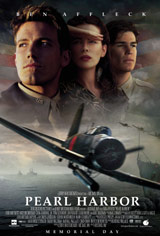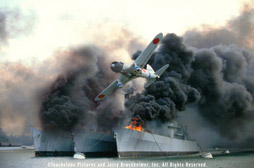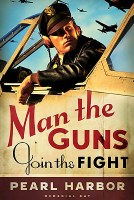| Pearl Harbor |
| |
 |
USA, 2001. Rated PG-13. 183 minutes.
Cast: Ben Affleck, Josh Hartnett,
Kate Beckinsale, Cuba Gooding, Jr., Alec Baldwin, Jon Voight, Tom Sizemore,
Dan Ackroyd, James King, Ewen Bremner, William Lee Scott, Catherine Kellner
Writer: Randall Wallace
Music: Hans Zimmer
Cinematographer: John Schwartzman
Producers: Jerry Bruckheimer, Michael Bay
Director: Michael Bay
LINKS
|
 ynicism
is not a friend to a movie like Pearl Harbor--an iconic film in an iconoclastic
age. I am not a schlock apologist (except in the case of guilty pleasures),
but director Michael Bay's Pearl Harbor isn't schlock, and I'm not making
any apologies for it. While all its problems don't rest with it being a throwback
in the wrong time, there is quite a bit about Pearl Harbor that I found
to be well done and welcome in this cynical age.
ynicism
is not a friend to a movie like Pearl Harbor--an iconic film in an iconoclastic
age. I am not a schlock apologist (except in the case of guilty pleasures),
but director Michael Bay's Pearl Harbor isn't schlock, and I'm not making
any apologies for it. While all its problems don't rest with it being a throwback
in the wrong time, there is quite a bit about Pearl Harbor that I found
to be well done and welcome in this cynical age.
There is no glory in war, which is why we impose glory upon it, to make it
easier to deal with, so the people who fought and survived and the people at
home have something to help them accept it. Recent war movies have been metaphorical
psychological portraits of humanity's foibles writ large on the field of battle,
political screeds against unjust governments both friend and foe, or exercises
in guilt-purging. This is not to say they haven't been brilliant films. But
what about the sort of clear-eyed film made to honor people and what they thought
they were fighting for, without the modern political correctness and revisionism
that robs both the survivors and the dead of their honor? Is there room anymore
for un-ironic heroes who aren't totems for our deepest hidden demons, but rather
idealizations of our fondest hopes of human accomplishment?
This is an old-fashioned heroism-because-we-need-heroes story. It works, and
I do believe it works for the most part, because it makes a point of making
heroes out of everyone who died at Pearl Harbor. As over the top as the movie's
heroes are, those who died at Pearl Harbor and the men who lived to fight in
World War II and in all our other wars, in some way, deserve to be glorified
to that extent. If one can abandon the jaundiced eye of the modern filmgoer
and go into Pearl Harbor without political agendas or anticipating a
masterpiece (or a travesty), the movie is good enough. 
Pearl Harbor opens with our heroes as young boys, then jumps to early
1941 when they're in their 20s and are both Army pilots. These ten minutes establish
all the character traits that we're going to get about Rafe McCawley (Ben Affleck)
and Danny Walker (Josh Hartnett): they share a lifelong friendship and love
of flying, the older one's an overprotective hot-dog who isn't so good with
letters, the younger is sensitive and slightly worshipful of the older and isn't
too confident when he's not in an airplane. Much has been made about the love
story that makes up the first part of the film being a soap opera. It is and
not a particularly good one. Depending upon how you feel about soap operas and
the three lead actors, you may find it unbearable. If you are a fan of any of
the stars, you can just sit and admire how pretty they are, since Bay lights
them all, especially Affleck, as if the sun exists merely to burnish their golden
flesh. There are a few charming and amusing moments, but the primary relationship
between Rafe and the Navy nurse he meets, Evelyn Johnson (Kate Beckinsale),
doesn't click, mainly because Affleck and Beckinsale have no chemistry whatsoever.
Their acting is fine; there's just no spark. This fizzle becomes even clearer
later in the film when Evelyn and Danny fall in love, because the chemistry
between Hartnett and Beckinsale sizzles.
There's little point in describing the plot, since everyone is going to see
this movie for the attack. The attack is jaw dropping. It's teeth clenching.
It's spectacular and realistic and scary. It's everything you could want it
to be. Our heroes manage to get in some airplanes and shoot down some Japanese
Zero fighter planes. (This is based in fact. Two American Army pilots did get
up in their planes and shot down 13 Japanese fighters). The aftermath is poignant
and upsetting. The president (Jon Voight) is distraught and declares war. A
difficult, dangerous, and largely symbolic counterattack raid led by Col. James
Doolittle (Alec Baldwin) is launched. (The film's portrayal of the raid is also
mainly factual.) Some of the raiders come back and some don't. They are all
heroes.
What surprised me about the film was not the larger-than-life heroism of the
leads, but the depth of the portrayal of the bombing. Yes, it's one of the most,
if not the most, spectacular battle scenes put on film, but it's not spectacular
in the sense of "Wow! Look at that! Isn't that cool!" It was a harrowing attack
to sit through, and engaged me almost as much as the opening sequence of Saving
Private Ryan did--hand to mouth in fear and awe, body tensed in anticipation
of each new destruction of hundreds of lives. Only in two brief instances does
Bay overplay it--employing hackneyed devices of the fallen flag and an innocent
doggie--practically handing us an engraved invitation to be cynical and remove
ourselves from the immediacy and horror of the carnage. It is an easy feeling
to shake as the sequence continues, though. The attack scene doesn't make war
seem wonderful, nor does the retaliatory raid portrayed later in the film. It
shows how horrific it must have been to wake up into your normal world on a
Sunday morning, not on alert because you thought you were safe, to have bombs
and torpedoes destroy your ship and kill a great many of your mates.
Part recruiting poster, part love-letter, part memorial, part propaganda--Pearl
Harbor wants to be the sort of movie released in America during the war.
It has the sort of corny dialogue one expects when one watches an old war movie.
 It
has the sort of soapy love story one expects when one watches an old wartime
romance. It could have come straight from Hollywood's World War II American-propaganda
machine, but for the various concessions made to today's political correctness
and what we in our smaller world know to be "the truth" about the attack.
It
has the sort of soapy love story one expects when one watches an old wartime
romance. It could have come straight from Hollywood's World War II American-propaganda
machine, but for the various concessions made to today's political correctness
and what we in our smaller world know to be "the truth" about the attack.
Unfortunately, such updating, necessary though it might be, throws the film
off kilter. Grand heroism demands grand villainy, but modern understanding (not
to mention international marketing) won't accept the way Americans actually
thought of "the enemy" back then. This is partly why war movies aren't made
this way anymore, unless we're battling aliens. A realistic, humanized villain
going against a larger-than-life hero tends to make the hero look silly. In
a sense, it might have been better for the film if it didn't attempt to explain
the Japanese position. Perhaps the heroes wouldn't have seemed so outlandish
if the film had shown only the menace of the Japanese readying for attack and
not introduced the Admiral's seeming reluctance to follow through on "what had
to be done." (Though, apparently, it is true that the Admiral said "We have
awakened a sleeping giant.") Of course, had that happened, the film would have
been blasted more than it has been for being politically incorrect, and any
thought of showing it in Japan would have gone right out the window.
Of course, an easier way to fix the problem of cartoon heroes is to make them
three-dimensional characters. The primary problem with Pearl Harbor is
that even a film made during Hollywood's propaganda heyday could have bothered
to give us lead characters with something more than half-sketched characteristics.
The boys are heroic and the girl is there for them to fight over. There's not
much more to the three of them than to be the embodiment of those who were there.
Much has been made of this movie's similarities to Titanic,
but that epic succeeded in creating real characters, especially Kate Winslet's
Rose, that not only start off with more than characteristics, but grow throughout
the course of the film based on their experiences within it. Rafe, Danny, and
Evelyn aren't real characters in the beginning, and they aren't real characters
by the end. Only Rafe makes a bit of a change once he's seen combat and no one
else has, and then he's simply more morose and intense. This isn't the fault
of the actors, who are all good enough, but of Randall Wallace's script (I'm
one of the few people I know who thought the characters in his Braveheart
were not fully realized either) and Michael Bay's focus on the attack.
AboutFilm.Com
The Big Picture
|
| Alison |
B-
|
| Carlo |
C+
|
| Claudia |
B-
|
| Dana |
-
|
| Jeff |
-
|
| ratings explained |
Bay and Wallace depend too much on the fact that any soldier, sailor, or nurse
who was present at the bombing will pull the heartstrings of all but the most
cynical American viewer, but that fact remains. The Japanese launched an early
morning surprise attack on December 7, 1941. Two pilots did the best they could
to get up into the air and shoot down some Japanese planes. A nurse with little
experience had to learn wartime triage and resorted to marking those who could
be helped with her lipstick for lack of anything else. A black cook, not allowed
to handle weapons in the segregated Navy, performed with valor beyond what the
regulations "allowed" and received a medal. Many men aboard the U.S.S. Arizona
were killed when a Japanese bomb sank it. Many more men were trapped when the
U.S.S. Oklahoma capsized. The United States' Pacific fleet was destroyed. Two
thousand, three hundred, eighty-eight Americans died. Pearl Harbor earnestly
shows all of this, and because of that, it is a moving, effective film.
A note on my viewing of the film: I watched Pearl Harbor in Annapolis,
Maryland, home to the U.S. Naval Academy on the day of the Academy's commencement.
A great many people in the audience were future Naval officers or active military,
or were the friends and relatives of active military personnel. I myself am
a relative of an active sailor, and am the descendant of a long line of Naval
officers, some of whom served in World War II. The tone of the audience was
muted and somber. There was no applause at the end of the film as I have heard
there was in other parts of the country. However, there wasn't the derisiveness
of a disappointed audience at the end, either. The mood was solemn as a great
many people pondered the potential for such an action in their future. Many
of them saw themselves or their loved ones on the screen. For that audience,
Pearl Harbor was a memorial to their forbears and a reminder of what
being in the military means. I don't think any of them found it a disservice
to the people in uniform who died at Pearl Harbor or anywhere else in America's
wars.
Review
© May 2001 by AboutFilm.Com and the author.
Images © 2001 Touchstone Pictures and Jerry Bruckheimer, Inc. All Rights
Reserved.


 It
has the sort of soapy love story one expects when one watches an old wartime
romance. It could have come straight from Hollywood's World War II American-propaganda
machine, but for the various concessions made to today's political correctness
and what we in our smaller world know to be "the truth" about the attack.
It
has the sort of soapy love story one expects when one watches an old wartime
romance. It could have come straight from Hollywood's World War II American-propaganda
machine, but for the various concessions made to today's political correctness
and what we in our smaller world know to be "the truth" about the attack.
